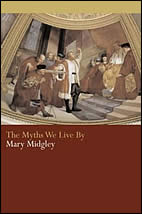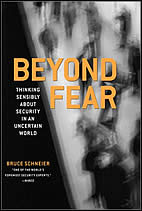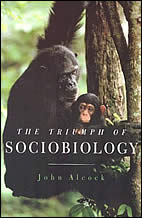Ya hablé de universos múltiples hace un tiempo, a propósito de un artículo en Scientific American. Pero el tema es muy controvertido y da mucho de sí. Aquí tenemos «My So-Called Universe» de Jim Holt donde comenta las respuestas recientes al asunto. En particular, este ensayo de Paul Davies y el último libro de Martin Gardner llamado Are Universes Thicker Than Blackberries? (que no he leído, así que me baso en lo que el artículo cita, aunque probablemente lo leeré porque me encantan sus libros).
Antes de empezar, me gustaría destacar una característica de la navaja de Occam -que dice más o menos que uno no debería multiplicar innecesariamente los términos, es decir si vale con un universo no debería postular varios. Obsérvese que no es más que un principio, si se quiere metafísico, no hay forma de demostrar su verdad. Como mucho, uno podría considerarlo útil desde un punto de vista pragmático: hasta ahora ha funcionado razonablemente bien. Pero obsérvese el «innecesariamente». El problema, claro está, yace en decidir cuándo algo es necesario o innecesario. Por otra parte, el principio no niega la existencia de otras entidades, simplemente dice que no vale la pena postularlas (entre dos explicaciones igualmente válidas, nos anima a escoger la más simple). Es decir, podrían existir universos múltiples aunque ninguna teoría exigiese su existencia. Por otra parte, ¿cómo decidimos si son necesarios o no? Si una teoría requiere la existencia de universos múltiples, ¿estamos obligados a aceptarlos?
Dejando de lado estas consideraciones, la cuestión es muy interesante, aunque cada autor lo lleva a su terreno. Por ejemplo, Paul Davies los discute en el contexto de la existencia de Dios. Por ejemplo, en el contexto de los universos múltiples los aparentes ajustes finos de nuestro universo (que podrían dar a entender la existencia de un Dios creador) no serían más que eso, aparentes. Si hay un número suficientemente grande de universos, incluso un número infinito de ellos, no tiene nada de extraño que el nuestro sea uno de los pocos de los universos con las condiciones adecuadas para la vida. Desde ese punto de vista, un creador sería una hipótesis científicamente innecesaria.
Pero Davies no está del todo convencido, y plantea un curioso argumento deslizante: partimos de una posibilidad y vamos desarrollándola y ampliándola hasta llegar a una conclusión «indeseable» (ahora explicaré las comillas). En su caso:
Problems also crop up in the small print. Among the myriad universes similar to ours will be some in which technological civilizations advance to the point of being able to simulate consciousness. Eventually, entire virtual worlds will be created inside computers, their conscious inhabitants unaware that they are the simulated products of somebody else’s technology. For every original world, there will be a stupendous number of available virtual worlds – some of which would even include machines simulating virtual worlds of their own, and so on ad infinitum.
Taking the multiverse theory at face value, therefore, means accepting that virtual worlds are more numerous than «real» ones. There is no reason to expect our world – the one in which you are reading this right now – to be real as opposed to a simulation. And the simulated inhabitants of a virtual world stand in the same relationship to the simulating system as human beings stand in relation to the traditional Creator.
Far from doing away with a transcendent Creator, the multiverse theory actually injects that very concept at almost every level of its logical structure. Gods and worlds, creators and creatures, lie embedded in each other, forming an infinite regress in unbounded space.
Es decir, si aceptamos la posibilidad de universos múltiples, según él nos vemos obligados a creer también en una sucesión recurrentes de niveles de universo generados artificialmente. Toda especie inteligente acabaría simulando la realidad, y dentro de esas simulaciones habría simulaciones de la realidad y así sucesivamente. Aplicando el principio de mediocridad, nos veríamos obligados a concluir que probablemente vivamos en una de esas simulaciones.
Yo por mi parte no veo el problema por ninguna parte. Si el universo resulta ser así, pues resulta ser así y ninguna preferencia humana lo hará cambiar (de hecho, Martin Rees parece aceptar la posibilidad sin mayor problema). Por otra parte, ¿cómo estamos seguros de que será posible simular una realidad donde a su vez sea posible simular otra realidad? Sin demostrar ese punto, el argumento pierde gran parte de su peso argumentativo.
Me interesante me parece su argumento de que invocar universos múltiples es prácticamente lo mismo que invocar a Dios. Después de todo, jamás experimentaremos los otros universos de la misma forma que jamás experimentaremos a Dios. ¿Seguro? Aquí habría que hacer una pequeña aclaración. Al menos conocemos un universo, por tanto sabemos que al menos un universo es posible y por tanto extrapolar más no es ir mucho más allá. Sin embargo, dioses no conocemos ninguno (al menos, científicamente) por tanto suponerlo exige más fe. Por otra parte, como bien dice Jim Holt, algunas teorías de multiverso parecen ofrecer hipótesis comprobables. Se comprobarán o no, pero en ese caso ya nos estamos moviendo en terrenos científicos y no teológicos.
De hecho, Holt concluye su repaso diciendo:
How seriously should you take multiple universes? That depends on how scrupulous you are about your ontological commitments. I know people who still regard atoms as theoretical fictions. I have friends who claim to doubt the reality of the past, of the future, of other minds. I have heard of academics-though I cannot believe they actually exist-who think that the cosmos is a social construction. But I am a robust scientific realist. If an empirically sound theory entails that unobservable entities exist, then I take them at face value. After all, reality has over and over again turned out to be much more inclusive than we’ve given it credit for being. Just a century ago, our puny Milky Way was thought to comprise the entire cosmos.
If the choices we make in our everyday lives seem a little absurd from the viewpoint of a single vast and eternal universe, then, from the viewpoint of an infinite ensemble of universes containing infinite copies of ourselves, all making every possible choice, they are absolutely absurd. Thankfully, in our own little world, those choices remain terribly meaningful and important.
En cuanto a Gardner, Holt lo cita diciendo:
«Surely the conjecture that there is just one universe and its Creator is infinitely simpler and easier to believe than that there are countless billions upon billions of worlds»
Afirmación que no me parece nada sorprendente viniendo de Gardner, quien suele ser martillo de parasicólogos. Por desgracia, el problema de los escépticos es que pasan tanto tiempo enfrentándose con los parapsicólogos que en ocasiones dan la impresión de considerar a todo el mundo como un parapsicólogo en potencia y a discutir ideas científicas algo heterodoxas como si fuesen una peligrosa forma de seudociencia. Por otra parte, ¿es más fácil creer en un creador que en miles de millones de universos? Para un deísta como Gardner, por supuesto que sí. Para un ateo como yo, la respuesta no está tan clara.
Y después de todo, ¿los universos múltiples eliminan al Creador? Me temo que como mucho, podrían eliminar su necesidad, pero no demostrar su inexistencia, porque eso es indemostrable. Por otra parte, tenemos siempre la necesidad de buscar una causa a todo y alguien podría bien preguntarse «¿de dónde salió el multiverso?».
[Estoy escuchando: «Uncle Fucka – Terrance And Phillip» de South Park en el disco Bigger Longer & Uncut]
 Formas de pensar. Símbolos. Mitos. Aproximaciones al mundo que no discutimos porque nos parecen evidentes. Metáforas. En cuanto uno reflexiona, son fáciles de identificar, pero en ocasiones su influjo es tan poderoso que no sólo no podemos evitar emplearla, sino que condicionan nuestra actuación en el mundo.
Formas de pensar. Símbolos. Mitos. Aproximaciones al mundo que no discutimos porque nos parecen evidentes. Metáforas. En cuanto uno reflexiona, son fáciles de identificar, pero en ocasiones su influjo es tan poderoso que no sólo no podemos evitar emplearla, sino que condicionan nuestra actuación en el mundo. En nombre de la seguridad se están tomando muchas medidas. Algunas de ellas parecen razonables, otras no tanto y otras parecen no tener nada que ve con la seguridad y parecen más bien intentos de alcanzar otros objetivos invocando el miedo. Para empezar a evaluar esas medidas, y poder decidir cuándo son razonables y cuándo son producto de otros intereses, Beyond Fear. Thinking Sensibly about Security in an Uncertain World de Bruce Schneier parece un buen punto de partida:
En nombre de la seguridad se están tomando muchas medidas. Algunas de ellas parecen razonables, otras no tanto y otras parecen no tener nada que ve con la seguridad y parecen más bien intentos de alcanzar otros objetivos invocando el miedo. Para empezar a evaluar esas medidas, y poder decidir cuándo son razonables y cuándo son producto de otros intereses, Beyond Fear. Thinking Sensibly about Security in an Uncertain World de Bruce Schneier parece un buen punto de partida: Si hace unos días comentaba un libro que trataba de la batalla de la sociobiología, después de la publicación de Sociobiology de Wilson, ahora otro que examina las aportaciones y los avances en sociobiología.
Si hace unos días comentaba un libro que trataba de la batalla de la sociobiología, después de la publicación de Sociobiology de Wilson, ahora otro que examina las aportaciones y los avances en sociobiología.